Archive for August, 2015
CBC Is Just NPR, Eh?
Posted by Joshua Sharf in Radio on August 21st, 2015
 In this long drive through the western provinces and the Yukon, radio is sparse and mostly FM, and I’ve been listening to a lot of CBC.
In this long drive through the western provinces and the Yukon, radio is sparse and mostly FM, and I’ve been listening to a lot of CBC.
Basically, it’s NPR with slightly Ontario accents. The production values of studio and phone interviews are identical. The intonation, speech patterns, measured tone of voice are cloned. Even the light-hearted, free-spirited political sketch comedy show (The Irrelevant Show) could be produced by Minnesota Public Radio but performed for a live audience in Alberta.
There’s one woman who hosts a culture show similar to Fresh Air, who sounds as though she grew up listening to Terry Gross and said, “I want to sound like that,” and spent her formative years practicing with a recorder. There’s another, a news reader, who would easily retire the prize in the annual Korva Coleman Impersonation Contest, which, given the uniformity of both NPR and CBC anchors, might actually be a thing.
The politics are roughly the same – ranging from the center-left to the left, with a little hard-left and center-right thrown in for the appearance of inclusivity. There’s slightly less emphasis on the racial and ethnic horrors of the past, but the source material is a little poorer there, though sexism real, imagined, and past, gets plenty of airtime.
And in case you were wondering, there’s always time to pick on Israel. In a segment about whether or not candidates’ families and personal lives were fair game in their campaign ads (not attack ads, mind you, but their own ads), one of the examples was a Conservative candidate who had mentioned his being the child of Holocaust survivors. This is a riding that’s 22% Jewish. The ads were eventually pulled, and one of the panelists found that remarkable, since, and I’m paraphrasing, but not much, “up until now, the Tories have pretty much been no-holds-barred in going after the Israel issue with Jewish voters.” Another show gave an approving nod to a pro-Palestinian version of Birthright Israel, which sends visiting Jewish youth to the West Bank for self-defense shaming.
Of course, from a Canadian point of view, NPR is just the CBC with slightly Midwest accents. I’m not sure if anyone’s ever been asked, but it’s entirely possible that NPR consciously sees itself as the CBC of the South. Certainly the CBC was well-established by the time NPR started doing All Things Considered in the 70s. Also possible, but less likely, is that NPR sees itself as the BBC of the colonies, and ended up in roughly the same place as the CBC, albeit slightly more Americanized.
Call Western Union
Posted by Joshua Sharf in 2016 Presidential Race, Governor 2010 on August 11th, 2015
 “If you want to send a message, call Western Union.” – Samuel Goldwyn
“If you want to send a message, call Western Union.” – Samuel Goldwyn
Much if not all of the Trump boomlet is fueled by a frustration with and distrust of a party establishment that seems not only cozy with progressives, but comfortable with progressivism. Articles by both Reihan Salam and Glenn Reynolds have made this point, and it’s one that Mark Steyn has talked about. Americans are happy to play politics between the 40-yard-lines. Given a perpetual choice between 49-yard-lines, though, they rebel.
The problem is that this rebellion isn’t necessarily coherent, and is usually destructive. In 1968, Democrats sent a message to Lyndon Johnson, and got Richard Nixon elected. In 1992, Republicans sent a message to George H.W. Bush in the form of Pat Buchanan, and got Bill Clinton elected.
A close analogy is here in Colorado in the 2010 governor’s race. Unpopular incumbent Democrat Bill Ritter decided not to run for re-election amid rumors of personal scandal. The Republicans, with festering dissatisfaction at the “establishment” after losing marquee statewide races in 2004, 2006, and 2008, had a choice between stalwart conservative, but presumed establishment favorite, Rep. Scott McInnis of Glenwood Springs, and unknown, blank-slate, self-professed Tea Party businessman Dan Maes. When fellow Republicans satisfied a personal vendetta by leaking allegations of plagiarism just before the primary election, many Republicans registered their complaints by either not voting for McInnis or voting for Maes, who squeaked by with a major upset win.
The other factor was a widespread, small-l libertarian-fueled distrust and honestly hatred of the party officials and party officialdom. I was at Denver party breakfasts in 2008 when Dick Wadhams was raked over the coals by the Ron Paul people, and that resentfulness has percolated (and been stoked by the large-l Libertarians) ever since. It certainly was around in 2010.
Maes, frankly, had no business being the nominee, and no business being a statewide candidate. He had no idea what he was doing, no interest, apparently, in the nuts and bolts of an active campaign, no willingness to spend endless hours on the phone raising money. And the Republican party blew as good an opportunity as we ever had in the Tea Party year of 2010 to reassert control over state government.
The current national dynamics eerily and scarily resemble those of 2010 here in Colorado. Candidates actually capable of uniting the various factions of the party, or bringing a unique and valuable message, are getting shut out of the process because it’s All Trump All The Time.
While I remain convinced that there’s no way on God’s green earth the party will actually nominate Donald Trump as its presidential candidate, he’s sucking oxygen from as deep and talented a field as I’ve seen in my lifetime at the national level.
That depth, by the way, is also in large part the result of a 20-year effort to grow the party at the state legislative level. It’s meant letting each state party find its way and find horses for courses, as the saying goes. That’s resulted in Republican government in states as diverse as Michigan and Alabama, but it’s also meant that those state parties differ much more from each other than they might once have. The only person capable of uniting a national party is a presidential candidate, and the nominating process is a means of having the debate to decide where we want to go nationally.
A political party is a coalition of diverse interests, but there are elements outside the party who can’t stand that fact, and would be perfectly delighted to see the national party dissolve into factional bickering and resentfulness. There’s absolutely no good reason to let that happen, or to nominate less than our best this year.
But What Did They Learn?
Posted by Joshua Sharf in 2016 Presidential Race on August 10th, 2015
 Ted Cruz supporters are seizing on comments made by Carly Fiorina at the time of the 2013 government shutdown to try to paint her as a tool of the party establishment. Jake Tapper quoted her as saying:
Ted Cruz supporters are seizing on comments made by Carly Fiorina at the time of the 2013 government shutdown to try to paint her as a tool of the party establishment. Jake Tapper quoted her as saying:
“There’s no honor in charging a hill that you know you can’t take, only casualties, although Ted Cruz maybe got name recognition and money along the way,” said Fiorina. “But President Obama wanted this shutdown. And Ted Cruz played right into his hands.”
While Cruz himself has been silent on Fiorina’s remarks, his own recent comments on the Senate floor, where he took Majority Leader Mitch McConnell to task over both an Obamacare vote and a vote to reauthorize the Export-Import Bank show that he maintains that leading the shutdown was the right thing to do. Since it was his signature moment – much as Rand Paul’s filibuster to save us from the imminent threat of drone warfare on Main Street was his – it’s hard to see where he has any other choice.
He and they may think that, but ultimately, this was and remains a fight over tactics, not goals. With the exception of Jeb Bush, I can’t think of another Republican candidate who doesn’t want to repeal Obamacare outright, and even Bush’s hedging is usually on the way to a discussion about what to do next, instead of leaving things as they were. Cruz led the shutdown effort which was a polling disaster for Republicans, and could well have led to failing to take the Senate yet again, had the Obamacare and healthcare.gov rollouts not be such a train wreck themselves.
In my mind, while losing the fight was demoralizing, the shutdown tactic more or less resembled the famous Sidney Harris cartoon. There was a start, and an end, but step 2 was always more than a little fuzzy; there was no chance that then-Majority Leader Reid was going to pass a bill on to the White House defunding Obama’s signature domestic legislation. For Fiorina to say at the time that the shutdown played to Obama’s favor was to say no more than many others were saying at the time. Revisiting what was a fight over strategy and trying to cast it as a willingness to accept the status quo may be clever – Fiorina will have to come up with a strong response to avoid looking defensive. But I’m not sure that it’s good for the party.
For me, Cruz would earn a lot of points by at least realizing that the strategy was doomed, that it did indeed fail, and that the cry of, “It would have worked if only everyone had followed me,” fails to take into account reasons that Republicans might not have followed him. Instead, I’d like to see him discuss why it failed, and what he learned from the experience.
Fiorina has a “What I learned from my failure” story of her own to tell from her signature career moment, and likewise, so far has been reluctant to tell it. Fiorina’s tenure at HP was controversial, but appears to have been on the whole successful. Nevertheless, she was fired by the board in what she describes as a “boardroom brawl,” where the knives came out after many years of making enemies at the company.
Fiorina’s strength thus far has been the ability to take negative questions and turn them on their heads, a skill that would be priceless in confronting Madame Hillary and her media minions in the general election campaign. She’s tried to spin that as a result of making hard decisions, and no doubt that’s true.
But it’s only half the story. Success usually breeds loyalty, not hostility. And if her failure was one not of business but of politics, well, she’s running for president, not CEO. She would also do well to discuss what went wrong, what she learned from the experience that would serve her in this most political of jobs.



